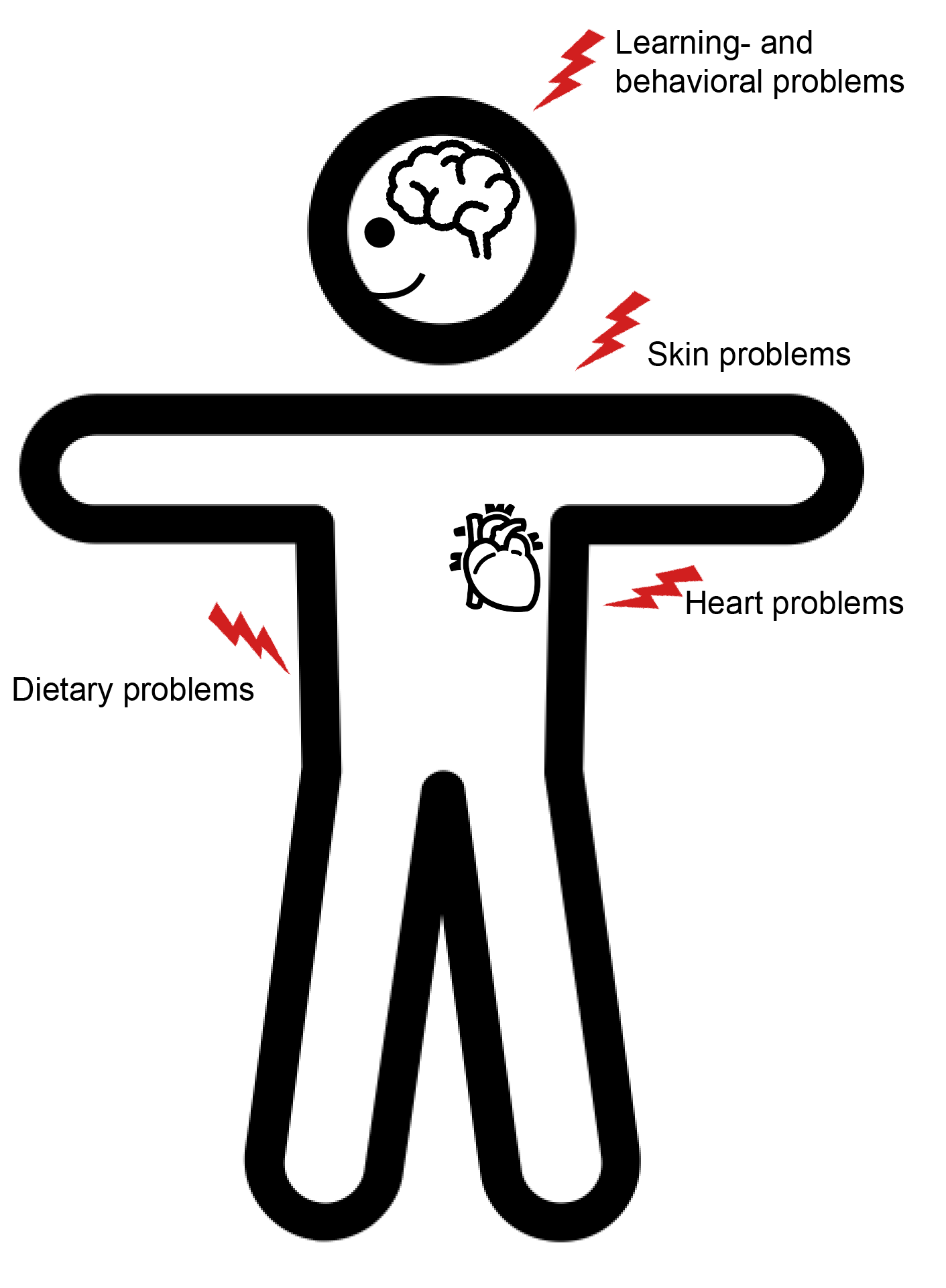What is Costello - CFC Syndrome?
Costello Syndrome:
 Costello Syndrome is a rare genetic condition that affects several parts of the body. The main features of Costello Syndrome are specific physical features, heart and skin conditions. The children show developmental delay with learning and behavioral problems. They often have serious nutritional problems at a young age and can have a disrupted hormone balance. They have an increased risk of getting specific types of cancer. There is currently no drug for the treatment of Costello Syndrome.
Costello Syndrome is a rare genetic condition that affects several parts of the body. The main features of Costello Syndrome are specific physical features, heart and skin conditions. The children show developmental delay with learning and behavioral problems. They often have serious nutritional problems at a young age and can have a disrupted hormone balance. They have an increased risk of getting specific types of cancer. There is currently no drug for the treatment of Costello Syndrome.
CFC Syndrome:
Cardio-Facio-Cutaneous (CFC) Syndrome is a rare genetic condition that affects several parts of the body. The main features of the CFC Syndrome are specific physical characteristics, heart and skin conditions. The children show developmental delay with learning and behavioral problems. They often have serious nutritional problems at a young age and can develop orthopedic conditions. There is currently no drug for the treatment of CFC Syndrome.
What causes Costello - CFC Syndrome?
The condition develops when a certain protein that the body makes is not working properly. The “recipe” for the production of this protein is stored in our genetic material, the DNA. The DNA contains the genetic code for our hereditary characteristics, the genes. The DNA is packed in chromosomes. Costello Syndrome is caused by a change in the HRAS gene. The CFC Syndrome is usually caused by a change in one of the four genes involved (BRAF, MEK1, MEK2 and KRAS gene). In all these cases, the protein is too active.
The characteristics of Costello-, CFC Syndrome and also Noonan Syndrome can be very similar. This is understandable because these syndromes belong to a group of genetic disorders in which the affected proteins are related. They relay specific signals in the cell from one protein to the other. Nevertheless, it is important to distinguish the syndromes, because some of the symptoms are different for each syndrome.
Almost all patients with Costello or CFC Syndrome are the only ones in their family. The change in the gene arose spontaneously during fertilization. A parent can also be a carrier. The syndromes inherit autosomal dominant; this means that if one of the parents has the syndrome, there is a 50% (1 in 2) chance of having a child with the syndrome with each pregnancy. This applies to both daughters and sons.
How often does Costello - CFC Syndrome occur?
The syndromes are very rare conditions. Costello Syndrome is estimated to occur in 1 in 300,000 people and CFC Syndrome in 1 in 800,000 people.
Examination and diagnosis
Based on the physical characteristics, medical conditions (for example a congenital heart defect), nutritional and development problems, a suspicion of Costello or CFC Syndrome in babies or at a toddler age may arise. The diagnosis can be confirmed with the help of genetic research in the blood. In particular at young age, the conditions can present so similar that they cannot be distinguished with certainty without genetic testing.
The Costello - CFC consultation hour
In the Erasmus MC ENCORE expertise center, we will see your child annually or once every 2 years. Prior to the first consultation hour, as much information as possible is collected via a questionnaire. A telephone conversation will decide which specialists are needed for your child.

During the outpatient visit, your child will be seen by a multidisciplinary core team consisting of a pediatrician, pediatric neurologist and dermatologist. Guidance from other specialists may be required, such as a clinical geneticist, cardiologist, ophthalmologist, orthopedist or endocrinologist.
We also offer neuropsychological examinations by the neuropsychologist or child psychiatrist for children aged 4, 6, 11 and 15 years.
If the children are older than 18, they can be further guided by the adult ENCORE outpatient clinic of our hospital.
Based on the outpatient clinic visit, we plan a specific follow-up program, tailored to the needs of your child and you as a parent. We work closely with your child's local health care providers. Costello and CFC Syndrome cannot be cured. The treatment is aimed at reducing the complaints and preventing complications as much as possible. Attention to development and behavior is important for obtaining optimal development opportunities. Early intervention therapy such as physiotherapy, speech therapy and occupational therapy is often useful here.
Pediatrician - genetic and congenital disorders and coordinator: Drs. Barbara Sibbles
Pediatric neurologist: Dr. Marie-Claire de Wit
(Pediatric) dermatologist: Prof. Dr. Suzanne Pasmans
Internist Endocrinologist: Dr. Laura de Graaff
Pediatric cardiologist
Clinical geneticist
Ophthalmologist (eye doctor):
Orthopedic surgeon
Pediatric Endocrinologist
GZ psychologist
Child psychiatrist
Click here to go to the contact form or mail yourself to: Cfc-Costello@erasmusmc.nl
In order to provide the best possible care to patients with a rare condition, it is essential that global knowledge about the condition is gathered. Nationwide, centers of expertise have been set up to stimulate care for rare disorders and to gather knowledge. For the formal recognition of an expertise center by the Ministry of Health, an important condition is that the expertise center gathers, analyzes and shares knowledge through publications. These can be publications in scientific journals, but also treatment guidelines for health care professionals or information brochures for patients or caregivers. We optimize care and research within ENCORE through standardized follow-up and close collaboration between doctors and researchers. That way, we can ultimately develop better treatments for rare conditions. You may therefore be asked to participate in research. Participation in research is always on a voluntary basis. The data obtained is stored and analyzed in an anonymous form. All research has been approved in advance by an ethics review committee.
To learn more about Costello - CFC research at ENCORE, click here
Patient organization
Noonan Syndrome Foundation represents children and parents with Costello and CFC Syndrome, click here to go to the website.
Costellokids is an international association for Costello Syndrome, click here to go to the website.
CFC International is an international association for CFC Syndrome, click here to go to the website.
Extras
Gripp KW et al. Costello Syndrome: Clinical phenotype, genotype, and management guidelines. American Journal Medical Genetics 2019
Piermont MA et al. Cardio-Facio-Cutaneous Syndrome: Clinical Features, diagnosis, and management guidelines. Pediatrics 2014
